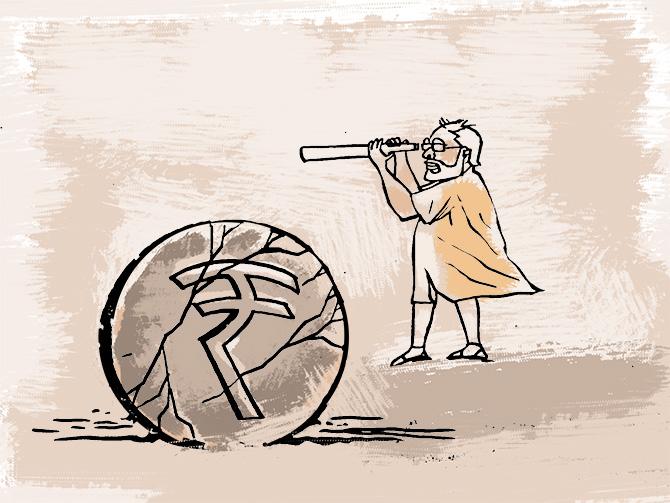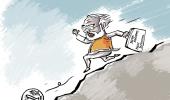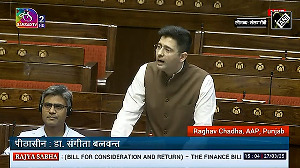Or do we need to retool our country, asks Ajit Balakrishnan.
Illustration: Dominic Xavier/Rediff.com

Open any newspaper or news Web site and the bad news is unrelenting.
It looks like a whole slew of industries is crashing: The passenger car manufacturers, telecom service providers, airlines, banks that lend money to small businesses, real estate developers, civil construction companies, TV broadcasters and -- hold your breath -- even information technology services export behemoths.
And the headline news makes it looks as if every indicator that economists follow -- gross domestic product, employment rate, the rupee to dollar rate -- is also heading downwards.
And depending on his political posture, the writer/columnist picks who or what to blame for the downslide: Corrupt businessmen, the Narendra Damodardas Modi government's reckless modernisation moves such as demonetisation, the goods and services tax and the focus on electric cars, a desperate finance ministry slapping unimaginably unfair taxes on Indian businesses, China and its world-dominating ambition or Donald Trump and America's new-found protectionist stance.
And the antidotes being proposed for this desperate situation -- decrease bank interest rates, reduce inflation and sell-off loss-making State-owned companies -- all have the familiar re-assuring sound and tone of a 1960's Lata Mangeshkar/Mohammed Rafi song, calming us into a sleepy stupor.
Let's pause here and let's check whether there are any 'inter-connectedness' to these mystifying downward trends.
Is it that a lack of car parking space and excessively crowded roads in cities are leading to people in the active working group not buy cars?
Is that what's leading to the fall in car sales, which in turn is leading to car manufacturers and their ancillary suppliers cutting production and jobs, and as a result income contraction for car dealers, petrol pumps, repair shops and car-financing companies?&
And are each of these players, in turn, sending ripples through their own eco-systems -- NBFCs, for instance, which are the main source of finance in Bharat are on their knees -- and is that what has brought Bharat's own businesses down?
If this is even partially true, should we be using the tools of Network Economics (Daran Acemoglu's piece, The Network Origins of Economic Fluctuations (external link), in Econometrica) to find out the degree centrality and other network values to clearly figure out the root causes quantitatively?
Or is it possible that the next boom in demand and jobs will be in services?
Could new technology bring down prices for things like medical diagnosis, legal fees, insurance and so on to perhaps a tenth of the current cost, which will make, for example, a visit to a general practitioner for a basic medical check-up cost a mere Rs 10 (not Rs 600 as it does today) and a comprehensive medical insurance cost Rs 100 a year (with no subsidy from the government) for a rickshaw puller's whole family?
Technology has the potential to drive demand for these services many fold. As James Bessen's National Bureau of Economic Research working papers No 24,235 from January 2018 points out: 'In an earlier era, cotton textile consumption soared following the introduction of the power loom at US textile units in 1814; steel consumption grew following the US adoption of the Bessemer steelmaking process in 1856, and Henry Ford's assembly line in 1913 initiated rapid growth in motor vehicles.'
And to make this happen, we may need to relook at India's current approach to innovation. The path that innovation takes even in 'capitalist' countries like the US is of State-drive initiatives. This is a 'well-kept secret' and the US media portrays the individual entrepreneur as the pioneer and hero.
Mariana Mazzucato's book, The Entrepreneurial State, debunks the myth of a lumbering, bureaucratic State versus a dynamic, innovative private sector.
In a series of case studies, in IT to biotechnology, she shows that the private sector finds the courage to invest only after the State, often the defence sector part of it, has made the high-risk investments.
She devotes a whole chapter to demonstrating that every technology that makes the iPhone so 'smart' was US defence department funded and private company executed: The Internet, global positioning system, its touch-screen display and the voice-activated Siri.
This is one area where India spectacularly fails. Defence funding is channelled to State-owned research organisations where scientists are merely bureaucrats holding meetings and sending out minutes of meetings and press releases, but have long ago stopped any innovative work.
Unless this tragedy is fixed, India's chances to create world-conquering and job-creating new industries are slim.
The real issue is, is it time for India to create a new industrial policy that takes an intelligent middle path between being completely State-driven on the one hand and being worshippers of unbridled liberalisation on the other?
Fred Block's 2008 paper, Swimming Against the Current: The Rise of the Hidden Development State in the United States, spells this out and points out that we need to fashion an agenda for economic policies that take an intelligent intermediate stand.
Such a renewed call for an industrial policy should not be mistaken for a call to return to a bygone era where State actions dominated the economy.
What it says is that in this era where rapid technological change is a reality, government has an increasingly important role in encouraging the advance of new technologies in the business economy.
As Block explains, this means an industrial policy in which government officials consult with technologists in both business and academia to identify technological challenges, the solution to which will open up entirely new industries, recognising all the while that the real constraints to innovation tend to be on the demand side.
No amount of fiddling with interest-rates and inflation-targets or subsidies is going to help.
Ajit Balakrishnan, founder and CEO, Rediff.com, is the author of The Wave Rider, A Chronicle of the Information Age. You can reach him at ajitb@rediffmail.com












 © 2025
© 2025